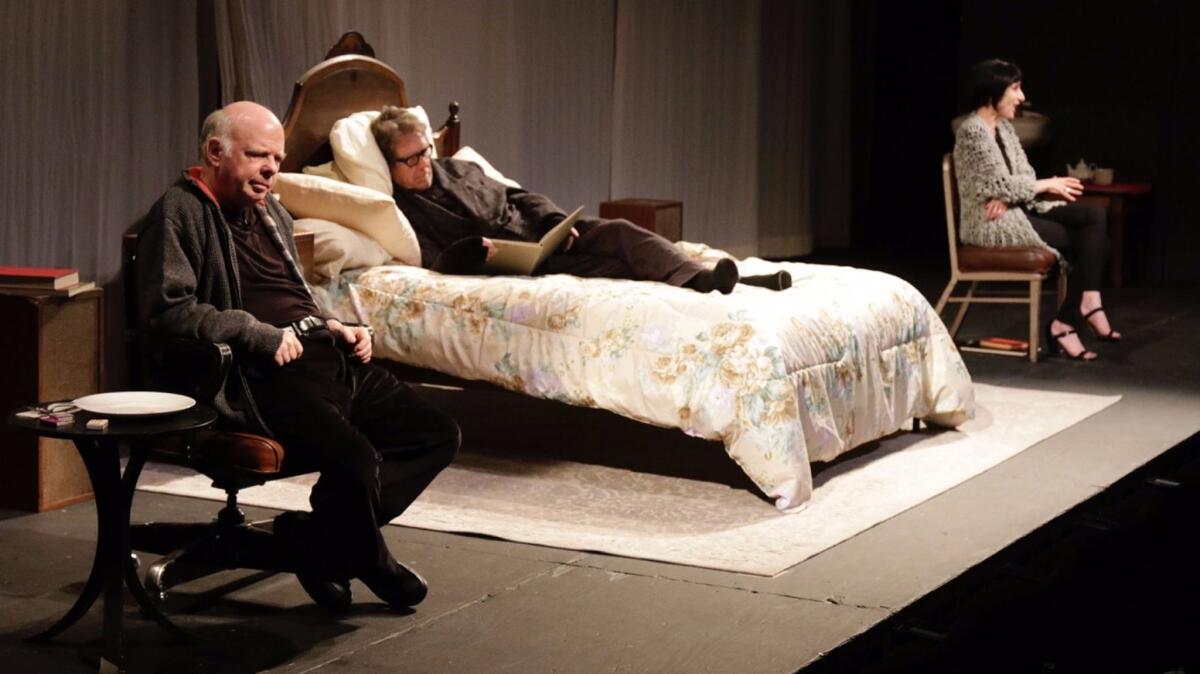Review: Wallace Shawn’s ‘The Designated Mourner’ gets new relevance in the Trump era

Wallace Shawn’s “The Designated Mourner,” set in an unnamed totalitarian state, is being revived at REDCAT at a time when American democracy and the rule of law are under siege. The dystopia, I’m sorry to say, doesn’t seem quite as distant as it did when the play had its premiere in London in 1996.
When I saw “The Designated Mourner” in New York in 2000, I thought it was an intriguing puzzle piece by a writer who enjoys nothing more than challenging the assumptions and pieties of his high-minded audience.
This revival, directed once again by André Gregory and featuring his original New York cast (Shawn, in all his inimitable glory, Deborah Eisenberg and Larry Pine), is a good deal more unsettling today. The play, a series of interlocking monologues, recounts the story of how a class of intellectual elites is eventually obliterated in an authoritarian society with little tolerance for free thought.
But the focus is on the way the background threat of political violence systematically degrades those layers of values that, however arbitrary, hypocritical and unfairly privileged they may be, give meaning to our social identities. “The Designated Mourner” is a long funeral Mass for a vanished culture in which the man delivering the ambivalent eulogy doesn’t seem to fully recognize that he too is no longer alive.
Shawn plays Jack, the self-appointed designated mourner, who is married to Judy (Eisenberg), daughter of Howard (Pine), a writer of great renown. For much of the first act, these characters coexist in the same space, dominated by the bed in which Howard spends much of the day reading in his dressing gown. (Production designer Eugene Lee arranges a few pieces of vintage furniture on a set that never loses its identity as a stage.)
Jack shares with us how impressed he was initially to be in the cultivated company of this important man of letters, who decades ago switched from writing polemical essays to poetry because, well, no one in power cares much about poetry. But Jack’s resentments toward Howard, the kindly if self-satisfied leader of a rarefied literary milieu, build to the point that, as the political situation grows more dangerous, he demands that Judy choose between her father and him.
This synopsis makes “The Designated Mourner” seem more straightforward than it is. Shawn, a playwright whose work conforms to no dramatic handbook, obsessively teases out the contradiction and ironies in his tale. The play, nearly twice as long as David Hare’s 1997 film adaptation, is a talky, twisty marathon, clocking in at three hours.
But what makes the play especially tricky, and possibly infuriating to theatergoers seeking to be efficiently edified, is that Shawn doesn’t neatly sort out the subjective views of his characters. Not only is no one morally exemplary, but the title character is also the slipperiest of the bunch.
Jack spends a good deal of time riffing on his own character. He describes himself as “a former student of English literature who … went downhill from there!” He’s jealous not only of Howard and Judy’s closeness, which he finds somewhat unseemly, but of Howard’s access to the treasury of great literature, a realm in which Jack, “a vague hanger-on,” is fated to be an ignorant wanderer — a reader of John Donne who will never be able to appreciate his genius.
But all this acute self-consciousness doesn’t make Jack a more reliable narrator. In fact, there’s something suspect about the indifferent way in which he keeps showing off his warts.
“To live,” Ibsen once wrote, “is to battle with trolls in heart and mind; to write is to sit in judgment on oneself.” Shawn, who updated Ibsen’s “The Master Builder” for the screen in a film directed by Jonathan Demme, has always adhered to this philosophy. In “The Designated Mourner,” Shawn allows Jack’s own words to damn him even as the character can’t stop condemning all the phoniness, affectation and bad faith around him.
His company, admittedly, can grow tiresome. The audience at the opening-night performance noticeably thinned after the lengthy first act, but I was lured on by the descriptive brilliance of Shawn’s prose — the way a “rodent”-like woman in Howard’s set, for example, is compared to “a cloth you might use to polish silver with.”
The sculptured grace of Shawn’s sentences and the invigorating slap of his metaphors ease some of the frustration inherent in a story that often seems to be chasing its own tail. Gregory’s sparely elegant staging (even with a few technical sound snafus) seductively enhances the writing by connecting it to the anguished chatterboxes of Beckett and to the self-dramatizing postmodern exhibitionists who followed.
The play’s complicated moral vision may be elusive to the point of blurriness, but the low-key wonder of the performances keeps us eagerly pursuing a deeper human truth. Pine is able to suggest Howard’s nature simply by adjusting his reading glasses or curling up on his side. Smugness turns to vulnerability with the drop of his eyebrow.
Eisenberg (Shawn’s partner in life and a brilliant fiction writer in her own right) exudes the literary ambience of the world Judy was born into. Her character may be the sketchiest of the three, but she embodies a convincing amalgam of intelligence, pride and helpless concern.
Shawn unsparingly exhibits a character only he could get away with. The slyness of his strategy, the way he assimilates us by degrees to Jack’s disintegration, is so perfectly pulled off that when he confesses to defecating on a book in the bathtub we hardly bat an eye.
The production, presented as part of Urgent Voices, a REDCAT series confronting the world’s parlous state, provides a timely warning for those of us numbly fixated on the day’s disastrous headlines and terrifying news alerts: In obsessively monitoring our society’s decline, we can easily overlook the rot spreading inside us.
♦ ♦ ♦ ♦ ♦ ♦ ♦ ♦ ♦ ♦
‘The Designated Mourner’
Where: REDCAT, 631 W. 2nd St., Los Angeles.
When: 8 p.m. Tuesday-Saturday, 3 p.m. Sunday; ends May 21.
Tickets: $50-$55
Information: (213) 237-2800 or www.redcat.org
Running time: 3 hours
SIGN UP for the free Essential Arts & Culture newsletter »
Follow me @charlesmcnulty
ALSO
Rajiv Joseph’s ‘Archduke’ is an ambitious mix of history, comedy and tragedy
A critic’s take on the Tony nominations: Rewards for shows that take risks
2017 Tony Awards: The complete list of nominations
The teachers who waited in line nearly 24 hours to get ‘Hamilton’ tickets for students
More to Read
The biggest entertainment stories
Get our big stories about Hollywood, film, television, music, arts, culture and more right in your inbox as soon as they publish.
You may occasionally receive promotional content from the Los Angeles Times.











